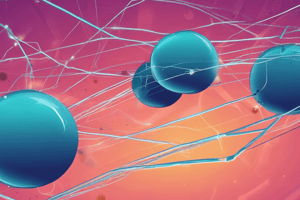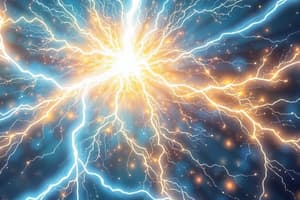Podcast
Questions and Answers
Particles with electric charge interact with other particles with electric ______
Particles with electric charge interact with other particles with electric ______
charge
Two kinds of electric charge exist: positive and ______
Two kinds of electric charge exist: positive and ______
negative
Objects that have equal numbers of positively charged particles and negatively charged particles are called ______
Objects that have equal numbers of positively charged particles and negatively charged particles are called ______
neutral
Electric charge is a property of matter that causes electrical ______
Electric charge is a property of matter that causes electrical ______
Most objects you regularly encounter are ______ because they have no overall charge
Most objects you regularly encounter are ______ because they have no overall charge
When your friend pulls a wool sweater over his head, negatively charged particles from the sweater transfer to each hair on his head, making each strand of hair negatively charged.
When your friend pulls a wool sweater over his head, negatively charged particles from the sweater transfer to each hair on his head, making each strand of hair negatively charged.
The electric force between strands of hair that have the same charge is repulsive.
The electric force between strands of hair that have the same charge is repulsive.
When two objects have opposite charges, the electric forces between them are repulsive.
When two objects have opposite charges, the electric forces between them are repulsive.
Rubbing a balloon on your hair will give the balloon a positive charge.
Rubbing a balloon on your hair will give the balloon a positive charge.
When a negatively charged balloon is held close to the wall, the area near the balloon becomes positively charged due to the repulsion of the negatively charged particles in the wall.
When a negatively charged balloon is held close to the wall, the area near the balloon becomes positively charged due to the repulsion of the negatively charged particles in the wall.
The strength of the electric field tells you how strong the force would be if you put a particle with 2 C of charge in it.
The strength of the electric field tells you how strong the force would be if you put a particle with 2 C of charge in it.
Electric fields that surround charged objects are similar to magnetic fields that surround objects that have mass.
Electric fields that surround charged objects are similar to magnetic fields that surround objects that have mass.
A test object, when discussing electric fields, is an imaginary object with exactly 1 C of charge.
A test object, when discussing electric fields, is an imaginary object with exactly 1 C of charge.
Particles with 0.5 C of charge would experience twice as much force in an electric field.
Particles with 0.5 C of charge would experience twice as much force in an electric field.
When two objects have opposite charges, the electric forces between them are attractive.
When two objects have opposite charges, the electric forces between them are attractive.
Electric fields predict the force on an object, specifically a positively charged test object.
Electric fields predict the force on an object, specifically a positively charged test object.
When you rub a balloon on your hair, the negatively charged particles that moved to the balloon stay near the surface of the balloon and do not move around in the rubber that makes up the balloon.
When you rub a balloon on your hair, the negatively charged particles that moved to the balloon stay near the surface of the balloon and do not move around in the rubber that makes up the balloon.
Electric charges can move through all materials, regardless of their properties.
Electric charges can move through all materials, regardless of their properties.
Electric current can travel through all materials at the same rate.
Electric current can travel through all materials at the same rate.
Most metals, such as copper, iron, and gold, are insulators.
Most metals, such as copper, iron, and gold, are insulators.
Flashcards are hidden until you start studying




